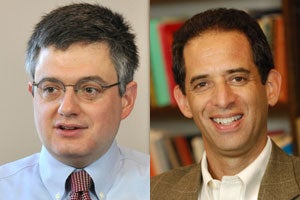The Harvard Law School Library recently hosted Professors John Goldberg and Henry Smith for a discussion of their contributions to Oxford University Press’s new series, “Introductions to U.S. Law” (2010).
“The premise of this series, it’s fair to say…has been to find a way to work back and forth between a broad general understanding of a subject, like torts or property, and the particulars with which we as professors and you as students get obsessed in the course of learning a subject like torts or property,” Goldberg said.
“The view of the authors is that truly seeing the forest helps you understand the trees…and that the trees actually line up to make a forest. And that’s a contentious claim…because many would say that it’s a mistake to think these subjects hang together in any sort of strong or tight way,” he added.
Goldberg, who joined the Harvard Law School faculty in 2008, is an expert in tort law, tort theory, and political philosophy, and is the co-author of The Oxford Introductions to U.S. Law: Torts. The book provides a comprehensive account of what tort law is and how it works, as well as analyses of leading judicial decisions and tort-related legislation. Topics covered include products liability, negligence, medical malpractice, intentional torts, defamation and privacy torts, punitive damages and tort reform.
“My claim: getting the big picture helps make sense of particular aspects of tort doctrine, and yet can also orient us toward tort more generally,” said Goldberg. “Once we know what tort is and what it isn’t, we can be much more intelligent about questions that are pervading our politics today: Why should we have tort law? Should we modify or replace it, and how much value do we place on having a part of our law devoted to the articulation of legal, injurious, relational wrongs when we could cover the same terrain by some other body of law, like insurance law?”
Smith, the Fessenden Professor of Law and Director of the Project on the Foundations of Private Law at Harvard Law School, is the co-author of The Oxford Introductions to U.S. Law: Property.
An expert in intellectual property, natural resources, property, and taxation, Smith emphasized the importance of understanding that there is a cohesive structure inherent in property law.
“Traditionally, in the last few decades, the tendency in property in terms of scholarship and teaching, has been to regard property as a sort of formalist grab-bag,” Smith noted.
Instead, Smith called for an understanding of the holistic view of property—“its architecture and how its pieces fit together.”
Oxford’s Property volume provides an overview of property law and emphasizes its central issues and policy debates, as well as how it affects larger concerns with individual autonomy, personhood and economic organization.
